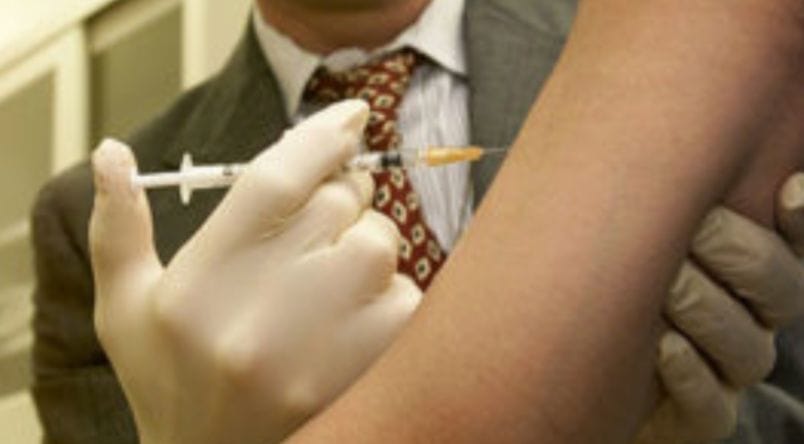Amid news from vaccine makers and CDC that the Covid-19 vaccines are waning in effectiveness after about six months, and are not very effective against the dreaded “Delta” variant, numerous companies and organizations are mandating vaccination for their employees, anyway, or endorsing the idea.
Walmart and Disney are reportedly two of the latest companies to mandate Covid-19 vaccination for their employees.
Some workers support the vaccine mandates; while others are protesting it.
Meantime, medical groups differ on whether it’s a good idea to force vaccinations.
The American Medical Association, American Nurses Association, American Academy of Pediatrics, Association of American Medical Colleges, and National Association for Home Care and Hospice have all endorsed vaccine mandates for all health care workers. You can read the full statement below.
Meantime, other medical groups oppose the vaccine mandates.
Among the opposition is the Association of American Physicians and Surgeons, which has issued a statement “in support of the right of all, including medical workers, to decline medical intervention. You can read the full statement below.
Statement in Support of the Right of All, Including Medical Workers, to Decline Medical Intervention
Due to the Joint Statement by various organizations that all “health care and long-term care employers” should impose a requirement to receive “the COVID-19 vaccine” on all their workers, the Association of American Physicians and Surgeons (AAPS) declares that all human beings have the right to liberty, which they do not forfeit when they serve the sick or the disabled. The ethical commitment to protect others does not require workers to surrender their bodily integrity and self-determination and accept “the” intervention dictated by a governmental or quasi-governmental authority.
As around half the population has received injections permitted under an Emergency Use Authorization (EUA), which by federal law cannot be coerced, variant strains of SARS-CoV-2 have been proliferating, and hospitalizations and deaths are increasing, not diminishing as one would expect in an effective vaccination campaign. Both vaccinated and unvaccinated persons are succumbing. Reports of post-injection death or long-term disability to the Vaccine Adverse Event Reporting System (VAERS) are reaching unprecedented levels.
There is no medical intervention that is completely safe or effective, and risks and benefits differ in individual patients and differing circumstances. Achieving a premature stamp of approval from the Food and Drug Administration (FDA)—premature because studies are not scheduled to be complete until the end of 2022—does not confer safety or effectiveness. FDA-approved products have frequently been withdrawn.
The Joint Statement recognizes only a medical exemption, and omits mention of a religious exemption though many workers think these products violate their religious beliefs. Medical exemptions are virtually never recognized for the COVID vaccines, because there is improper denial that they cause harm to anyone.
Long-term effects of these novel, genetically engineered products cannot possibly be known at this point. These could include autoimmune disorders, antibody-enhanced disease, infertility, cancer, or birth defects.
Employers are obligated to protect their workers from foreseeable hazards, even from risks as low or lower than 1 in 10,000, and to compensate them if they suffer an injury. They are not permitted to impose risks that may well be that significant, especially without compensation. Benefit to the public does not justify sacrificing workers who do not willingly accept the risk. Moreover, the benefit to the public in this instance is purely hypothetical. Uninfected persons cannot transmit infection just because they are unvaccinated. Vaccinated persons can still infect others. Many medical workers already have natural immunity, and mandated shots impose risks without any benefit at all, yet there is no provision to exempt them.
AAPS favors insistence on fully informed, truly voluntary consent for all medical interventions. This includes full disclosure of all risks, and a diligent effort to identify and track risks. Otherwise, workers are being conscripted into a mass experiment, one which would not be approved by an Institutional Review Board on both ethical and scientific grounds: no consent; no disclosure of the experimenters’ conflicts of interest; no control group; no follow-up of subjects for COVID status, immune parameters, or adverse effects; no provision for medical care of the subjects; and no criteria for stopping the experiment if subjects are being harmed.
Instead of depending solely on experimental vaccines, medical institutions should be leading the way in innovative infection control such as ventilation and air purification; exemplary housekeeping to protect against all pathogens, including antibiotic-resistant bacteria; prophylactic and early treatment; and immune system support including adequate vitamin D. Our medical organizations should be advocating for free and open discussion, and opposing censorship by governmental agencies, media, Big Tech, and corporate health care.
Without freedom, there is no safety for either workers or our patients.
Joint Statement in Support of COVID-19 Vaccine Mandates for All Workers in Health and Long-Term Care
Due to the recent COVID-19 surge and the availability of safe and effective vaccines, our health care organizations and societies advocate that all health care and long-term care employers require their workers to receive the COVID-19 vaccine. This is the logical fulfillment of the ethical commitment of all health care workers to put patients as well as residents of long-term care facilities first and take all steps necessary to ensure their health and well-being.
Because of highly contagious variants, including the Delta variant, and significant numbers of unvaccinated people, COVID-19 cases, hospitalizations and deaths are once again rising throughout the United States. Vaccination is the primary way to put the pandemic behind us and avoid the return of stringent public health measures.
Unfortunately, many health care and long-term care personnel remain unvaccinated. As we move towards full FDA approval of the currently available vaccines, all health care workers should get vaccinated for their own health, and to protect their colleagues, families, residents of long-term care facilities and patients. This is especially necessary to protect those who are vulnerable, including unvaccinated children and the immunocompromised. Indeed, this is why many health care and long-term care organizations already require vaccinations for influenza, hepatitis B, and pertussis.
We call for all health care and long-term care employers to require their employees to be vaccinated against COVID-19.
We stand with the growing number of experts and institutions that support the requirement for universal vaccination of health workers. While we recognize some workers cannot be vaccinated because of identified medical reasons and should be exempted from a mandate, they constitute a small minority of all workers. Employers should consider any applicable state laws on a case-by-case basis.
Existing COVID-19 vaccine mandates have proven effective. Simultaneously, we recognize the historical mistrust of health care institutions, including among many in our own health care workforce. We must continue to address workers’ concerns, engage with marginalized populations, and work with trusted messengers to improve vaccine acceptance.
As the health care community leads the way in requiring vaccines for our employees, we hope all other employers across the country will follow our lead and implement effective policies to ensure vaccination. The health and safety of U.S. workers, families, communities, and the nation depends on it.



